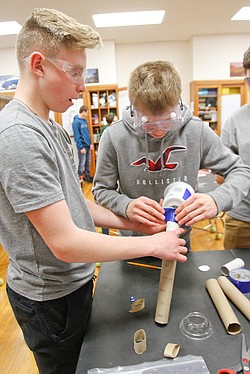Poland schools foundation grant powers STEM activities
POLAND
Gabbie Seifert, an eighth-grade student at Poland Middle School, excitedly came up to her teacher, Jill Marconi.
She proudly displayed her group’s handiwork – a game piece that spins to land on different point values with the press of a button.
Gabbie and classmates Lauren Minehart and Celina Dennis made the game spinner during a recent period of their STEM – science, technology, engineering, and mathematics – course. Marconi teaches STEM to sixth-, seventh-, and eighth-grade students, for whom the subject is now required.
To make their game spinner, the girls used littleBits, educational kits that contain electronic building blocks. Other groups used the kits to make items ranging from an arcade game to a windmill to a remote-controlled bobble head.
Marconi recently added two more of the kits to her classroom thanks to a $570 grant she received from the Poland Schools Foundation for Educational Excellence.
The schools foundation recently awarded approximately $10,000 in grant funding to seven applicants for the 2016-17 school year.
The funded projects benefit students at every grade level. For example, $2,508 will buy new iPads for kindergarten classes; $1,440 will fund a Junior Achievement Program for third- and fourth-graders; and $625 will go to web site setup for the high-school newspaper and a K-12 journalism program. The largest award – $3,395 – will provide new video production equipment for high-schoolers.
This round of grant funding brings the foundation’s overall contributions to the school district to $300,000 since 1991, foundation president Luke Politsky noted.
“We realize that there are certain funds set aside by each of the principals in the buildings that don’t necessarily go toward special projects that would really benefit our students,” he said of the grants. “There might be something someone has in the works and they really don’t have the funding. That’s when we step in and help the teachers go above and beyond for their students.”
Marconi, noting that STEM promotes problem-solving and critical-thinking, is confident the extra littleBits kits will be helpful to her students.
“It allows students to make things move,” she explained. The kits contain “input” and “output” pieces. A vibration motor, for example, is an output piece. A pressure sensor is an input piece.
Marconi likes to give her students some unstructured time with the kits on top of using them for more traditional lessons. On that particular day, she handed out “challenge” cards that students tackled in small groups.
“Every now and then, they just need time to be creative,” she said. “They sit in class all day and listen to lectures.”
Students seemed to love working with the kits, and STEM class in general.
“You’re never just sitting there. You’re always interacting with things,” said Gabbie.
“I like building things, and being creative,” said Anthony Weimer.
“It’s fun. I like using the kits because it’s more advanced,” said Mason Planey.
As the bell signaling the end of class sounded, one student exclaimed, “Dang it!”
“That’s what I like to hear,” Marconi said, smiling.
 43
43

